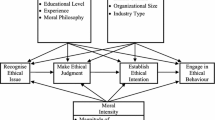Abstract
In the United States, a series of survey studies have been done to examine corporate managers' views of business ethics and various business practices (Baumhart, 1961; Brenner and Molander, 1977; Vitell and Festervand, 1987). This paper is a replication study conducted in Japan of those American studies. The results of the study suggest that Japanese managers tend to be more situational in their ethical orientation than Americans. The results also show that the company policy on ethics is the most important factor influencing Japanese managers' ethical decisions.
Similar content being viewed by others
References
Baumhart, R. C.: 1961, ‘How Ethical Are Businessmen?’, Harvard Business Review 39, 6–176.
Benedict, R.: 1946, The Chrysanthemum and the Sword: Patterns of Japanese Culture (Houghton Mifflin, Boston, MA).
Brenner, S. N. and E. A. Molander: 1977, ‘Is the Ethics of Business Changing?’, Harvard Business Review 55, 57–71.
Center for Business Ethics at Bentley College: 1986, ‘Are Corporations Institutionalizing Ethics?’, Journal of Business Ethics 5, 85–91.
Center for Business Ethics at Bentley College: 1992, ‘Instilling Ethical Values in Large Corporations’, Journal of Business Ethics 11, 883–867.
Hamaguchi, E.: 1977, ‘Nihon-rashisa’ no Sai-Hakken (Rediscovering ‘Japanese-ness’) (Nihon-Keizai Shimbun-sha, Tokyo).
Japan Productivity Center: 1991, Kigyo Rinri no Seidoka ni Mukete (Toward the Institutionalization of Ethics in Business) (Japan Productivity Center, Tokyo).
Japan Productivity Center: 1993, Nihonteki-Keiei no Sai-kouchiku no Houkou wo Saguru (Searching the Direction for Restructuring Japanese Management) (Japan Productivity Center, Tokyo)
Kuno, K.: 1977, ‘Kigyo Moral no Nichi-Bei Hiakau (A Comparative Study of Corporate Morals between Japan and the U.S.)’, Diamond Harvard Business (November–December 1977), 36–44.
Thurow, L. C.: 1992, Head to Head (William Morrow and Company, New York).
Vitell, S. T. and T. A. Festervand: 1987, ‘Business Ethics: Conflicts, Practices, and Beliefs of Industrial Executives’, Journal of Business Ethics 6, 111–122.
Vogel, D.: 1992, ‘The Globalization of Business Ethics: Why America Remains Distinctive’, Walter A. Haas School of Business, University of California at Berkeley, Business & Public Policy Working Paper BPP-52.
Yoshihara, H.: 1994, ‘Kigyo Rinri no Jissho-Bunseki (An Empirical Analysis of Business Ethics)’, in the Proceedings of the 68th Annual Meeting of Japan, Society of Business Administration, pp. 28–34.
Author information
Authors and Affiliations
Rights and permissions
About this article
Cite this article
Nakano, C. A Survey Study of Japanese Managers' Views of Business Ethics. Journal of Business Ethics 16, 1737–1751 (1997). https://doi.org/10.1023/A:1017922002410
Issue Date:
DOI: https://doi.org/10.1023/A:1017922002410




